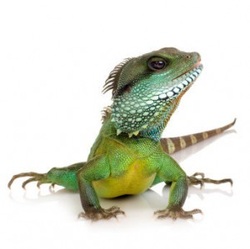
It may be counter-intuitive, since many exotic pets originate from hot climates, but exotic pets can suffer if they are exposed to too much heat.
If you own an exotic pet, you will no doubt have educated yourself on pet care tips relating to that type of creature so that you know how best to feed it and how to spot any ill-health. But avoiding overheating your pet might not be something you’re aware of because excess heat isn’t usually a problem we experience here in the UK. And, of course, most people would assume that exotic pets can handle a bit of heat.
In fact, pets like lizards and frogs can suffer terribly if they are exposed to too much heat and this problem is exacerbated by the fact that they are usually kept in glass tanks.
Cold-blooded exotic pets require sensitive pet care when the heat rises, because they don’t regulate their own body temperature but rely on their environment to do so. You need to keep a close eye on the temperature of their tank or cage and if they require a moist, humid environment make sure you regularly mist the inside of their tank. Invest in a thermometer that you can place in their tank because the temperature inside the tank can be far higher than it is in the room in which it’s kept.
To keep your exotic pet cool, you may just need to switch off their heater. But make sure that their tank is not placed in direct sunlight, whether in summer months or not, and during warmer months consider moving your pet to somewhere cool within the house, such as the under-stairs cupboard or the cellar (though of course make sure you spend plenty of time with them as you normally would).
Frequently check that your pet has enough water, since obviously it will evaporate more quickly in hot weather. Also keep a close eye on your pet to watch for signs of heat stroke, which can include panting, trembling or difficulty in moving. If they show signs of heat stroke, take them to a cooler location straightaway, and seek urgent advice from your vet.
Finally, if you are going on holiday and have arranged for a neighbour or friend to care for your pet in your absence, remember that your neighbour might not be as aware of these issues as you are and make sure that they would know what to do if the temperature in the UK were to soar whilst you’re away.
If you own an exotic pet, you will no doubt have educated yourself on pet care tips relating to that type of creature so that you know how best to feed it and how to spot any ill-health. But avoiding overheating your pet might not be something you’re aware of because excess heat isn’t usually a problem we experience here in the UK. And, of course, most people would assume that exotic pets can handle a bit of heat.
In fact, pets like lizards and frogs can suffer terribly if they are exposed to too much heat and this problem is exacerbated by the fact that they are usually kept in glass tanks.
Cold-blooded exotic pets require sensitive pet care when the heat rises, because they don’t regulate their own body temperature but rely on their environment to do so. You need to keep a close eye on the temperature of their tank or cage and if they require a moist, humid environment make sure you regularly mist the inside of their tank. Invest in a thermometer that you can place in their tank because the temperature inside the tank can be far higher than it is in the room in which it’s kept.
To keep your exotic pet cool, you may just need to switch off their heater. But make sure that their tank is not placed in direct sunlight, whether in summer months or not, and during warmer months consider moving your pet to somewhere cool within the house, such as the under-stairs cupboard or the cellar (though of course make sure you spend plenty of time with them as you normally would).
Frequently check that your pet has enough water, since obviously it will evaporate more quickly in hot weather. Also keep a close eye on your pet to watch for signs of heat stroke, which can include panting, trembling or difficulty in moving. If they show signs of heat stroke, take them to a cooler location straightaway, and seek urgent advice from your vet.
Finally, if you are going on holiday and have arranged for a neighbour or friend to care for your pet in your absence, remember that your neighbour might not be as aware of these issues as you are and make sure that they would know what to do if the temperature in the UK were to soar whilst you’re away.

 RSS Feed
RSS Feed